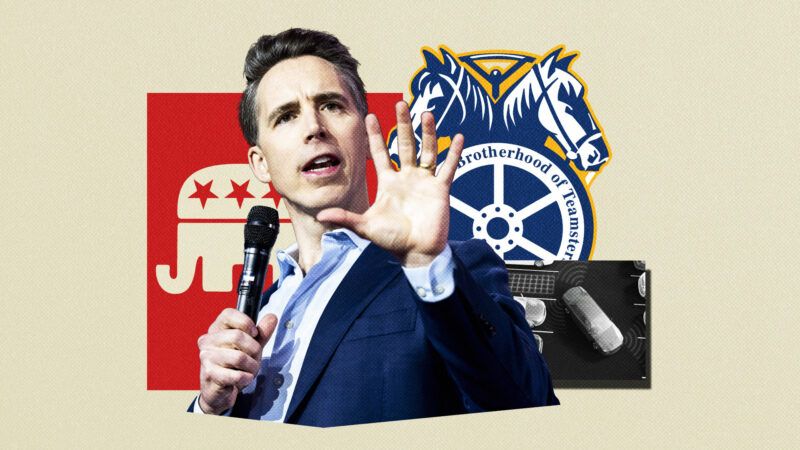The Teamsters' Alliance With the 'New Right' Was Never Going To Work
Autonomous vehicle developer Waymo is at the center of a fight between labor unions and venture capital that's dividing the populist right.

For some prominent members of the Republican Party's populist wing, a new alliance with labor unions seems to make perfect sense.
"This is a watershed moment," wrote Sen. Josh Hawley (R–Mo.) in Compact magazine just days after Teamsters union boss Sean O'Brien spoke at the Republican National Convention in July. Hawley wrote that "O'Brien gives us the roadmap" to future electoral victories, adding, "There is much that Republicans and labor can already agree on." He's not alone in believing as much. Compact's founder, Sohrab Ahmari, wrote in the pages of The Wall Street Journal in May that "consolidating the GOP's working-class gains in a second [Trump] term would require outreach to the friendlier corners of the labor movement."
Ostensibly, that's why O'Brian was invited to speak at the RNC. Here was tangible proof of the political realignment that so much of the so-called New Right has desired—an undeniable signal of the GOP's transformation into a working-class party, or at least an opportunity to snag some of the unions' campaign cash that usually flows exclusively to Democrats. Indeed, the Teamsters backed Hawley's reelection bid and then donated $45,000 to support this year's Republican convention, which The Washington Post termed "its first major donation to the GOP in decades."
The problems with that alliance should have been evident in mid-July. In the weeks since, they've become only more so.
In the weeks before O'Brien stepped on stage at the RNC, for example, the Teamsters published a series of press releases bragging about the union's effort to kneecap the development of autonomous vehicles in California and Arizona. Specifically, the Teamsters have been targeting Waymo, the autonomous vehicle developer that spun off from Google.
As a labor union that largely represents truck drivers, it's understandable why the Teamsters is fretting about technological developments that could reduce the dependence on human beings as delivery drivers. Politically, however, this campaign puts the Teamsters directly at odds with the investors in Waymo—like venture capital firm Andreessen Horowitz, which has poured billions into Waymo. It's also worth noting that one of the co-founders and principal investors at Andreessen Horowitz is Marc Andreessen, who is backing Trump's campaign and funding a pro-Trump super PAC.
That stands in pretty stark contrast to the Teamsters Against Trump super PAC that members of O'Brien's union have recently launched.
In short: Hawley and others in the New Right are getting chummy with the labor union boss who is leading a campaign against a project funded by some of the other most prominent figures in the Republican Party's populist wing.
Yes, major political parties always include factions that disagree about one thing or another. And, yes, the Republican Party has become rather unmoored from its principles in recent years.
Even so, it's hard to imagine how this tension can be reconciled.
Ahmari also seems to recognize that the two sides cannot coexist for long. "You can fawn over Elon Musk or you can run a populist political campaign," he wrote in an essay last month for The New Statesman. In it, Ahmari criticized Trump for undermining his populist appeal by sidling up to Musk and Silicon Valley tech bosses.
Trump is not guided by ideology or a detailed understanding of policy—but he seems to grasp that the union-skeptical venture capitalists represent the better path forward. And where he goes, the Republican Party follows.
The specific players and inside baseball of it all are less important than the general trends. If it seems impossible for the GOP to accommodate both Waymo and the union that wants to kill Waymo, then the party will sooner or later have to pick a side: Will it be a party of innovation and techno-optimism, or a cranky collection of Luddites wrapped around a labor movement that is in decline?


Show Comments (80)